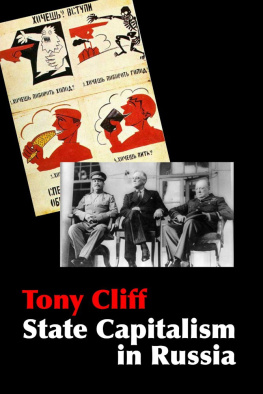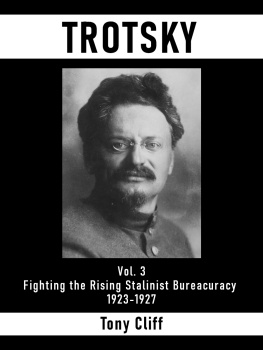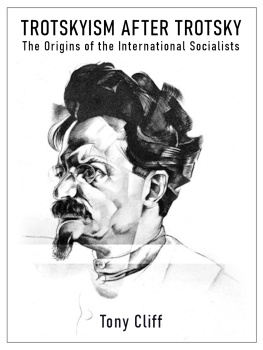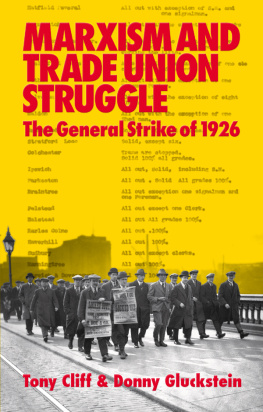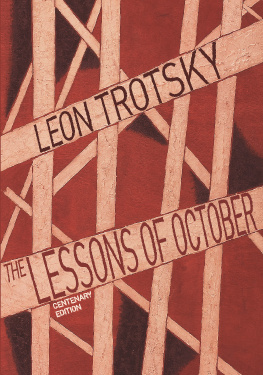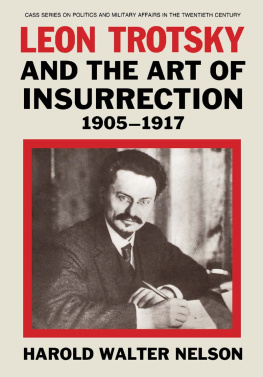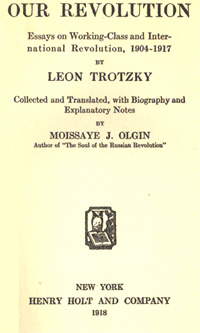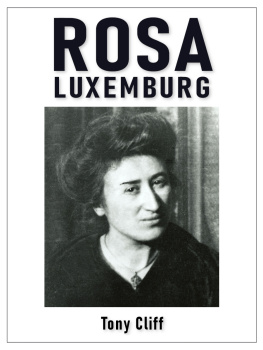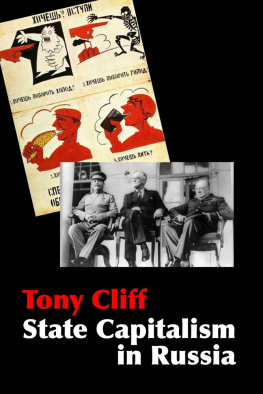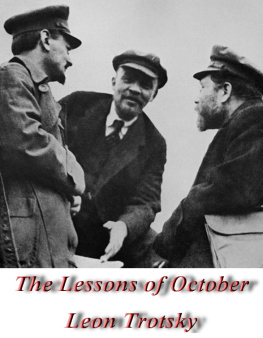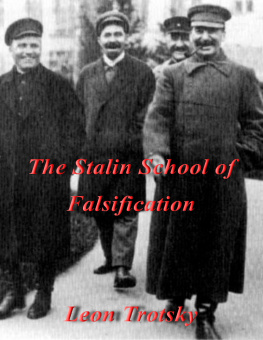Tony Cliff - Trotsky: Vol. 1. Towards October 1879-1917
Here you can read online Tony Cliff - Trotsky: Vol. 1. Towards October 1879-1917 full text of the book (entire story) in english for free. Download pdf and epub, get meaning, cover and reviews about this ebook. year: 2020, publisher: Marxists Internet Archive, genre: Religion. Description of the work, (preface) as well as reviews are available. Best literature library LitArk.com created for fans of good reading and offers a wide selection of genres:
Romance novel
Science fiction
Adventure
Detective
Science
History
Home and family
Prose
Art
Politics
Computer
Non-fiction
Religion
Business
Children
Humor
Choose a favorite category and find really read worthwhile books. Enjoy immersion in the world of imagination, feel the emotions of the characters or learn something new for yourself, make an fascinating discovery.
- Book:Trotsky: Vol. 1. Towards October 1879-1917
- Author:
- Publisher:Marxists Internet Archive
- Genre:
- Year:2020
- Rating:5 / 5
- Favourites:Add to favourites
- Your mark:
- 100
- 1
- 2
- 3
- 4
- 5
Trotsky: Vol. 1. Towards October 1879-1917: summary, description and annotation
We offer to read an annotation, description, summary or preface (depends on what the author of the book "Trotsky: Vol. 1. Towards October 1879-1917" wrote himself). If you haven't found the necessary information about the book — write in the comments, we will try to find it.
Trotsky: Vol. 1. Towards October 1879-1917 — read online for free the complete book (whole text) full work
Below is the text of the book, divided by pages. System saving the place of the last page read, allows you to conveniently read the book "Trotsky: Vol. 1. Towards October 1879-1917" online for free, without having to search again every time where you left off. Put a bookmark, and you can go to the page where you finished reading at any time.
Font size:
Interval:
Bookmark:
1879-1917
Bookmarks, London, 1989.
Transcribed by Martin Fahlgren (July 2009)
Marked up by Einde OCallaghan for the Marxists Internet Archive
Converted to ebook format June 2020
Cover photograph: Mug shot from Russian secret police files, 1900.
Marxists Internet Archive
At the time of ebook conversion this title was out of print.
Other works of Tony Cliff are available in hardcopy from:
https://bookmarksbookshop.co.uk/
Several people have helped in the writing of this book. Many thanks are due to Chris Bambery, Alex Callinicos, Leslie Cunningham, Lindsey German, Donny Gluckstein, Chris Harman, Gareth Jenkins and Steve Wright for their advice and suggestion. I owe a debt to Linda Aitken and Ahmed Shawki for help in locating material, and to Peter Marsden for editing and advice. Chanie Rosenberg deserves a special thanks for participating in the editing of the manuscript and for typing it.
Tony Cliff
20 April 1990
Tony Cliff wrote many books. These include the classic State Capitalism in Russia (1974) and two previous political biographies: Rosa Luxemburg (1959) and Lenin (in three volumes 1975-79). He is also the co-author of The Labour Party: A Marxist History (1988).
IN WRITING a political biography of Leon Trotsky one has first of all to evaluate two previous biographies: Trotskys autobiography My Life, and Isaac Deutschers trilogy. Both appear to the present writer to be unsatisfactory.
First, Trotskys autobiography. Written as a document in the faction fight with Stalin, when the latter tried to describe Trotsky as an inveterate enemy of Lenin, My Life plays down the differences between Trotsky and Lenin. It undervalues Trotskys tremendous contributions where he differed from Lenin, notably downgrading Trotskys theory of permanent revolution. This theory was a unique contribution to Marxist thinking, no one at the time, not even Lenin, going as far as to maintain that Russia would be the first country in the world to have a socialist revolution and establish the dictatorship of the proletariat. All other Marxists believed that only industrially advanced Western Europe was ripe for the socialist revolution; Russia was heading towards a bourgeois revolution that would free the country from Tsarism and the legacy of feudalism and transform it into a modern capitalist country.
Trotskys contributions as organiser of the October insurrection and the Red Army are also played down. It is very unusual for an autobiography to underestimate the contribution of the author. The other side of this coin is the belittling of Trotskys mistakes in his opposition to Lenins ideas on the nature of the revolutionary party during the long period from 1903 to 1917. (In other writings Trotsky was emphatic in criticising his own position on the question of the party).
Furthermore, the autobiography ends with Trotskys exile from Russia in February 1929. A very significant chapter, possibly the most significant, of Trotskys political activity is completely missing. On 25 March 1935 Trotsky wrote in his diary:
Had I not been present in 1917 in Petersburg, the October Revolution would still have taken place on the condition that Lenin was present and in command. If neither Lenin nor I had been present in Petersburg, there would have been no October Revolution: the leadership of the Bolshevik Party would have prevented it from occurring of this I have not the slightest doubt! If Lenin had not been in Petersburg, I doubt whether I could have managed to conquer the resistance of the Bolshevik leaders But I repeat, granted the presence of Lenin the October Revolution would have been victorious anyway .
Thus I cannot speak of the indispensability of my own work, even about the period from 1917 to 1921. But now my work is indispensable in the full sense of the word. There is no arrogance in this claim at all. The collapse of the two Internationals has posed a problem which none of the leaders of these Internationals is at all equipped to solve. The vicissitudes of my personal fate have confronted me with this problem and armed me with important experience in dealing with it. There is now no one except me to carry out the mission of arming a new generation with the revolutionary method over the heads of the leaders of the Second and Third International.
In the years 1923-1940, when Trotsky was out of power, his contributions to the development of proletarian revolutionary strategy and tactics were stupendous, particularly after he was exiled. From a remote Turkish island, from a hiding place in the French Alps, from a Norwegian village, and finally from a suburb of Mexico City, Trotskys mind never ceased to embrace the international working-class struggle. Reading his writings on China, one has the impression that the author lived and struggled in Shanghai. His writings on Germany, France, Spain, Britain leave similar impressions. And throughout he had to contend with the fact that the Trotskyist groups in all these countries were tiny, made up of young, inexperienced people, and very isolated. Trotskys great genius, his vivid, realistic imagination, the grand sweep of his vision, make this chapter of his life one of the richest.
One of the most difficult problems was the question of the economic, political and cultural changes and struggles that faced a workers state in a backward country surrounded by much more advanced capitalist enemies. The experience of the Paris Commune was fleeting; now for the first time in world history a workers state was established over a whole country. Marxist theory arises out of practice; it generalises the past experience of humanity. While Trotsky fought consistently, relentlessly, against the degeneration of the revolution, against the rising Stalinist bureaucracy, the experience he had to rely on was very small, and it is not to be wondered at that his predictions about the future development of the Stalinist regime were not confirmed by events. No prognosis is ever confirmed in totality, especially when a very new phenomenon is dealt with.
Trotskys devotion to the revolutionary cause stood the test of the most tragic events: Stalins persecution and slander surpassed anything that had ever happened in history. His first wife was sent to a Stalinist labour camp, two of his four children were murdered by Stalinist agents, one died from consumption while her husband languished in Stalins prison and the fourth committed suicide; of his seven grandchildren only one, as far as we know, survived in freedom.
In terms of the immediate impact of his work, Trotskys years out of power were quite arid. But in the long-term historical development of the revolutionary socialist movement, in terms of keeping the Marxist tradition alive, this chapter was of crucial importance.
What about Deutschers biography of Trotsky, the trilogy The Prophet Armed, The Prophet Unarmed and The Prophet Outcast?
These books are of a high standard. Deutschers careful and exhaustive collation of sources and documents, together with his majestic style, lend great significance to his writings. Unfortunately, however, the spirit that dominates the trilogy is in complete opposition to that of its subject. For Trotsky the heart of Marxism is the self-activity of the working class; his relentless opposition to the Stalinist bureaucracy derived from that cardinal principle. He accused Stalin of betraying the Russian revolution and being the gravedigger of the international revolution. Hence the Russian proletariat has to make a new revolution to get rid of the stranglehold of the Stalinist bureaucracy. Trotskys concept of socialism is that of socialism from below; Deutschers of socialism from above.
Font size:
Interval:
Bookmark:
Similar books «Trotsky: Vol. 1. Towards October 1879-1917»
Look at similar books to Trotsky: Vol. 1. Towards October 1879-1917. We have selected literature similar in name and meaning in the hope of providing readers with more options to find new, interesting, not yet read works.
Discussion, reviews of the book Trotsky: Vol. 1. Towards October 1879-1917 and just readers' own opinions. Leave your comments, write what you think about the work, its meaning or the main characters. Specify what exactly you liked and what you didn't like, and why you think so.



